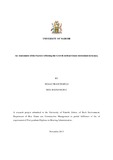| dc.description.abstract | Real Estate investment represents a significant portion of people's wealth and this is especially
true for many real estate investors in Kenya. Real Estate investment plays crucial role in
providing employment opportunities, offering shelter to households, enhancing income
distribution and alleviating poverty. However, the investment in Kenya continues to fail to fulfill
this fundamental role due to a number of unique factors that affect the sector. The study
investigated factors such as GDP Growth, the influence of interest rate, inflation rates and
population growth. The study adopted both quantitative and descriptive research design to
obtain information especially true for many real estate investors in Kenya. The study therefore,
investigated the contribution on the current status of the phenomenon. The population in this
study was real estate investors while the target population included private and public property
investors. Data for analysis was based on the real estate and renting businesses as sourced from
the various Economic Surveys and Kenya Statistical Abstracts Issues. The data obtained was
analyzed by use of the Statistical Package for Social Sciences (SPSS) to obtain descriptive
statistics and a regression model.
From the results the contribution of the factors affecting real estate growth as measured by
Pearson correlation coefficients indicated that GDP took the highest share with a value of 83%
followed by inflation growth at 78% while interest rate came third with value of 75%.
Population growth contributed the least to the growth in real estate investment with a value of 29
%. Therefore the study hypothesis that GDP is the most significant contributor to the growth in
real estate was supported by the data. In addition GDP growth, interest rate variation and growth
in inflation were found to be statistically significant determinant of real estate growth. A
summary of the regression results showed that the variables considered could explain up to about
70% of variations in the investment growth. The study recommended that Policy measures
geared toward improving the economic growth and curbing rising inflation rates and interest
rates should be undertaken as they increase the investment levels. Finally the study
recommended future research on the impact of population growth on real estate investment. | en_US |

